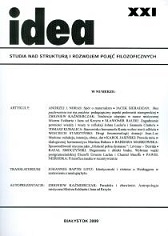Wittgenstein a buddyzm – co wynika z ich porównania
Wittgenstein and Buddism - a comparison
Author(s): Jacek SieradzanSubject(s): Philosophy
Published by: Wydawnictwo Uniwersytetu w Białymstoku
Keywords: Wittgenstein; Buddhism; language; understanding
Summary/Abstract: The text "Wittgenstein and Buddhism – a Comparison" is a review of works of 30 authors who wrote about similarities between the philosophy of Wittgenstein and that of Buddhism, mainly of Nagarjuna. The similarities which have been mentioned are: anti-dogmatic and anti-doctrinal nature, setting limits in which the use of language has sense, a mystical base of language, rejection of thought as useless for language and understanding, atheism, the notion of unity of world and existence, admiration over miraculous nature of the world, identity of micro- and macro-cosmos, the conviction that any antitheses are of an illusory nature, realizing peace and clarity of mind as the aim of philosophy, the impossibility of adequate naming of psychic emotions, rejection of universals, and the therapeutic aspect of philosophy. The main difference between Wittgenstein and Nagarjuna is that the former looked for the source of problems in language, and the latter in mind.
Journal: Idea. Studia nad strukturą i rozwojem pojęć filozoficznych
- Issue Year: 2013
- Issue No: XXV
- Page Range: 141-155
- Page Count: 15
- Language: Polish

